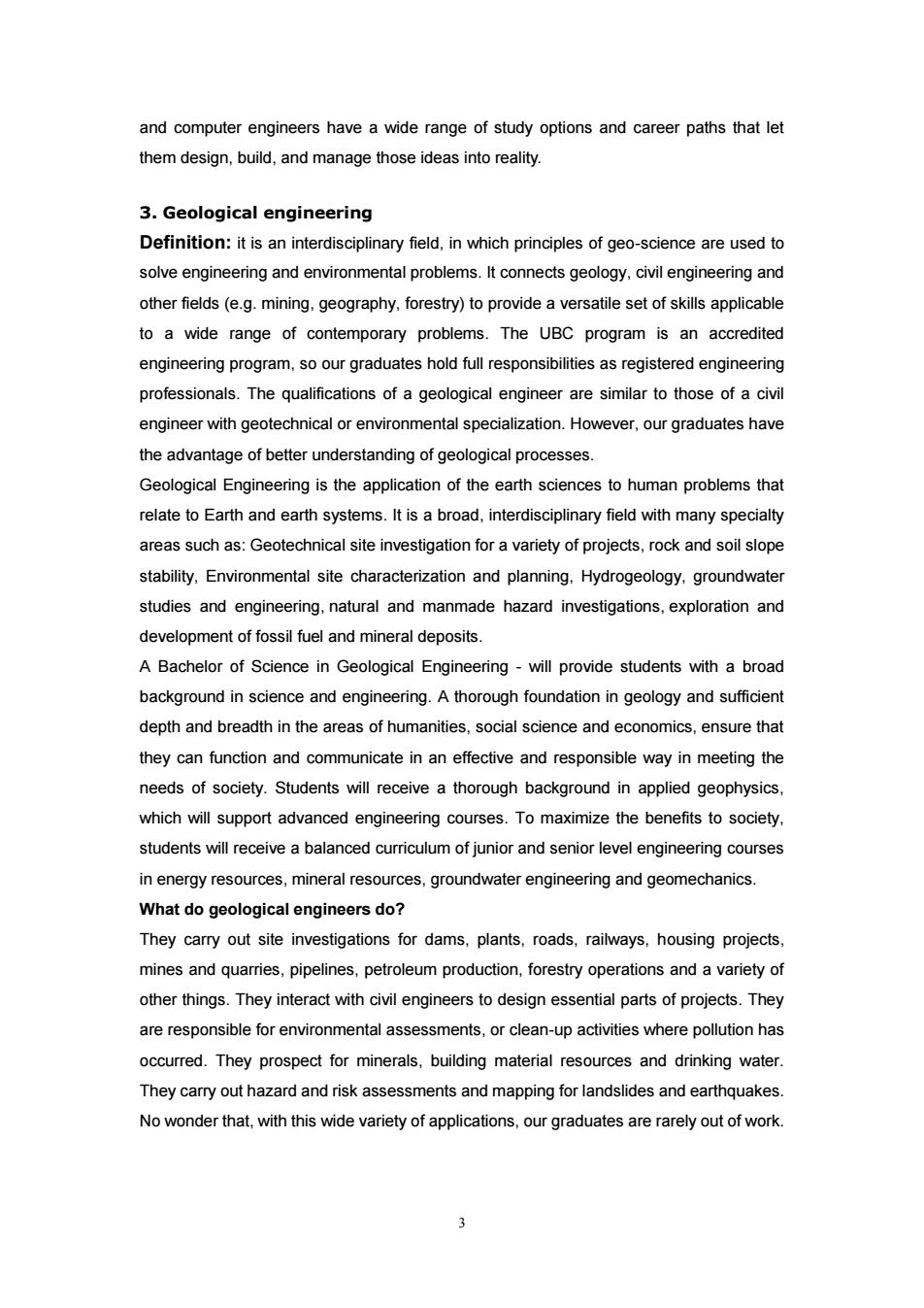正在加载图片...

and computer engineers have a wide range of study options and career paths that let them design,build,and manage those ideas into reality. 3.Geological engineering Definition:it is an interdisciplinary field,in which principles of geo-science are used to solve engineering and environmental problems.It connects geology,civil engineering and other fields (g.mining.geography.forestry)to provide a versatile set of skills applicable to a wide range of contemporary problems.The UBC program is an accredited engineering program.so our graduates hold full responsibilities as registered engineering professionals.The qualifications of a geological engineer are similar to those of a civil engineer with geotechnical or environmental specialization.However,our graduates have the advantage of better understanding of geological processes. Geological Engineering is the application of the earth sciences to human problems that relate to Earth and earth systems.It is a broad,interdisciplinary field with many specialty areas such as:Geotechnical site investigation for a variety of projects,rock and soil slope stability,Environmental site characterization and planning,Hydrogeology,groundwater studies and engineering.natural and manmade hazard investigations.exploration and development of fossil fuel and mineral deposits. A Bachelor of Science in Geological Engineering-will provide students with a broad background in science and engineering.A thorough foundation in geology and sufficient depth and breadth in the areas of humanities,social science and economics,ensure that they can function and communicate in an effective and responsible way in meeting the needs of society.Students will receive a thorough background in applied geophysics. which will support advanced engineering courses.To maximize the benefits to society. students will receive a balanced curriculum of junior and senior level engineering courses in energy resources,mineral resources,groundwater engineering and geomechanics. What do geological engineers do? They carry out site investigations for dams,plants,roads,railways.housing projects. mines and quarries,pipelines,petroleum production,forestry operations and a variety of other things.They interact with civil engineers to design essential parts of projects.They are responsible for environmental assessments,or clean-up activities where pollution has occurred.They prospect for minerals,building material resources and drinking water They carry out hazard and risk assessments and mapping for landslides and earthquakes No wonder that,with this wide variety of applications,our graduates are rarely out of work.3 and computer engineers have a wide range of study options and career paths that let them design, build, and manage those ideas into reality. 3. Geological engineering Definition: it is an interdisciplinary field, in which principles of geo-science are used to solve engineering and environmental problems. It connects geology, civil engineering and other fields (e.g. mining, geography, forestry) to provide a versatile set of skills applicable to a wide range of contemporary problems. The UBC program is an accredited engineering program, so our graduates hold full responsibilities as registered engineering professionals. The qualifications of a geological engineer are similar to those of a civil engineer with geotechnical or environmental specialization. However, our graduates have the advantage of better understanding of geological processes. Geological Engineering is the application of the earth sciences to human problems that relate to Earth and earth systems. It is a broad, interdisciplinary field with many specialty areas such as: Geotechnical site investigation for a variety of projects, rock and soil slope stability, Environmental site characterization and planning, Hydrogeology, groundwater studies and engineering, natural and manmade hazard investigations, exploration and development of fossil fuel and mineral deposits. A Bachelor of Science in Geological Engineering - will provide students with a broad background in science and engineering. A thorough foundation in geology and sufficient depth and breadth in the areas of humanities, social science and economics, ensure that they can function and communicate in an effective and responsible way in meeting the needs of society. Students will receive a thorough background in applied geophysics, which will support advanced engineering courses. To maximize the benefits to society, students will receive a balanced curriculum of junior and senior level engineering courses in energy resources, mineral resources, groundwater engineering and geomechanics. What do geological engineers do? They carry out site investigations for dams, plants, roads, railways, housing projects, mines and quarries, pipelines, petroleum production, forestry operations and a variety of other things. They interact with civil engineers to design essential parts of projects. They are responsible for environmental assessments, or clean-up activities where pollution has occurred. They prospect for minerals, building material resources and drinking water. They carry out hazard and risk assessments and mapping for landslides and earthquakes. No wonder that, with this wide variety of applications, our graduates are rarely out of work